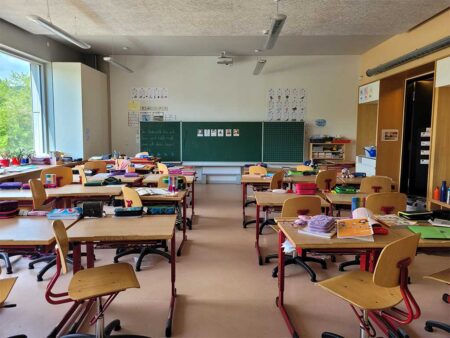
Dear Julie, My 4th grader has writing assignments for school on a fairly regular basis. I check his work, but he pulls away every time I tell him corrections to make. Am I right to correct his spelling and punctuation and make him do better? I don’t want him handing in incomplete work. Thanks, Sylvia
Another great question this week. In a nutshell, yes, you should be concerned and encourage him to do his best, but no, it’s not your job to correct it.
In elementary school, your job as a parent is not to be his teacher. You should encourage your child to do his best work–I’m constantly pulling out the eraser and telling my son I can’t read his writing, so he should write more clearly–but homework is sent home to work on concepts, and the concepts he works on should be to the best of his ability, not yours.
I’m reminded of a student I had in 2nd grade who was constantly handing in assignments that were clearly not his work. In class, this child hadn’t shown a clear understanding of commas or the correct places for capital letters, but his homework came in perfect every time. His stories in school had basic beginning, middle, and endings, but his homework short stories had detailed paragraphs… often seven or eight complete sentences long. When the children were assigned a biography book report that included a hand-drawn illustration, my bulletin board was covered in pictures that included coloring outside the lines, stick figures, and cartoon characters. And one perfectly illustrated image of Mr. T–straight to the feather earring with each piece of the feather shaded just right.
Enough was enough. It was clear that my student wasn’t doing his homework, a parent was. I had a folder full of perfect math worksheets and stories that were written with the imagery of a 14-year-old, not someone half his age.
I called home, and his mom gave me this explanation: It’s important to my husband and me that [child’s name] does his best work and that you see him for who he really is–a very intelligent child.
I responded that I already do see him as a very intelligent child but that I needed to see him doing his best, not someone else’s best. What he was learning, as his parents pushed him beyond his abilities, was that he was incapable of doing his best on his own and that he needed to rely on his parents to check and correct his homework to show his best. “Whose best is this?” I asked the mother.
She was very quiet.
Children bring homework home for reinforcement and to practice skills. Parents, when they have opportunities, should look over children’s work to continue to encourage them to do their best. But it’s not for a parent to correct every misspelling, mis-punctuation, and mis-factor on a worksheet. Teachers want to see what children are able to take out of the classroom and continue to do on their own. It’s when children can do what they’ve learned correctly that they’ve mastered a skill, not when their parents are editing and redoing their work.
Read more: Setting the tone for homework (younger grades).
How much editing and checking should you do? That really depends on your child and your child’s teacher and is an excellent question to ask at back-to-school nights or parent-teacher conference meetings.










4 Comments
I’m a homeschool mom so I have to correct papers. 🙂 However, I use that advice for my children’s piano lessons. I have played the piano for 30 years so I can easily correct them, but it’s easier on both of us – and they learn better – if I let the piano teacher correct them. Occasionally when I just can’t stand that they keep missing the sharp I tell them, but most of the time I try to let them go.
Yeah, homeschool parents have very different rules. 🙂 WOW! 30 years playing the piano! Do you play on a regular basis even now?
I am still a year away from the homework years, but this is really helpful!
When you’re ready for homework… I’ll definitely be around 🙂